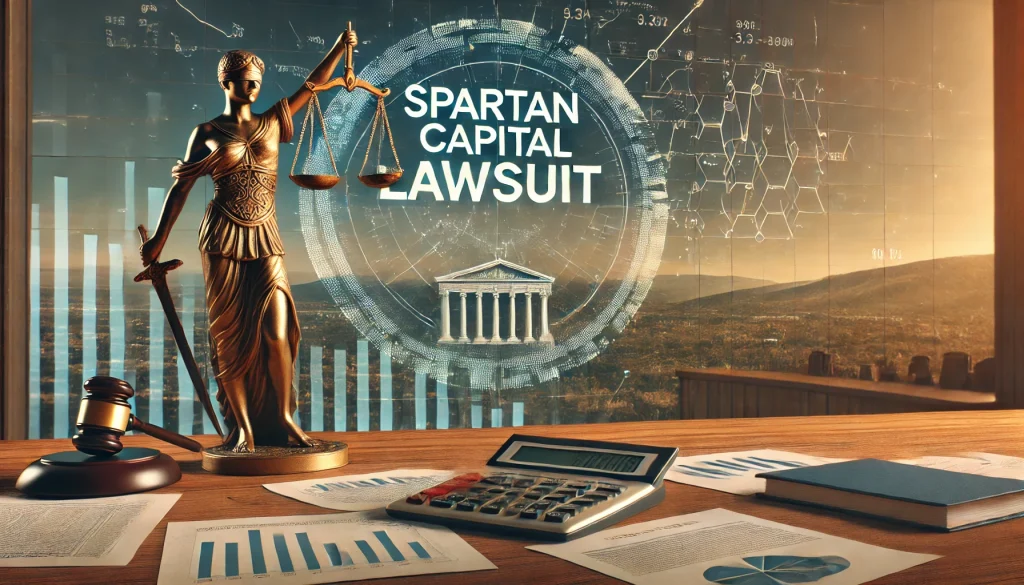The Spartan Capital Lawsuit has garnered significant attention in the financial and legal communities. This high-profile case highlights critical issues surrounding corporate compliance and investor protection, making it a focal point of industry discussions.
At the heart of the Spartan Capital Lawsuit are allegations of financial misconduct, sparking debates about regulatory enforcement and ethical standards in the sector. The case involves multiple parties and has unfolded in ways that shed light on the challenges of maintaining transparency in financial dealings.
As the Spartan Capital Lawsuit progresses, its implications for stakeholders and the broader financial market continue to evolve. Understanding the details of this lawsuit is essential for grasping the potential long-term impacts on the industry.
Key Developments in the Case
The Spartan Capital Lawsuit has seen a series of key developments since its initiation, each shaping the case’s trajectory. The lawsuit began with allegations of financial misconduct and fraudulent activities, prompting an official investigation by regulatory authorities.
In the early stages, preliminary hearings focused on collecting evidence and clarifying the nature of the claims. Several documents were submitted, including financial records and client testimonies, which laid the foundation for the legal proceedings.
One of the significant developments occurred when regulatory agencies imposed temporary restrictions on Spartan Capital’s operations, citing potential risks to investors. These measures aimed to safeguard stakeholders during the ongoing investigation.
A pivotal moment in the lawsuit was the announcement of formal charges against the firm and key individuals. These charges included claims of misrepresentation and unethical practices in client dealings.
Table: Timeline of Key Developments
| Date | Development |
| January 2023 | Initial allegations filed |
| March 2023 | Preliminary hearings begin |
| July 2023 | Temporary operational restrictions issued |
| October 2023 | Formal charges announced |
The case remains active, with legal proceedings and further investigations expected to continue in the coming months.
Understanding the Allegations
At the core of the Spartan Capital Lawsuit are serious allegations that have drawn the attention of both regulators and the public. These allegations primarily revolve around claims of financial misrepresentation and misleading investors.
Specific accusations include falsifying financial records to attract investments and failing to disclose critical risks associated with their offerings. Such practices, if proven, would constitute a violation of regulatory standards.
Investigators also alleged that Spartan Capital engaged in conflicts of interest, prioritizing their own gains over client benefits.
The allegations against Spartan Capital serve as a cautionary tale for the industry, emphasizing the importance of transparency.
This case underscores the potential consequences of non-compliance, as it raises awareness about safeguarding investor interests.
Parties Involved in the Legal Dispute
The Spartan Capital Lawsuit involves several key parties, each playing a critical role in the proceedings. Spartan Capital, as the defendant, is at the center of the case, with its operations and practices under scrutiny.
Regulatory bodies, including the Securities and Exchange Commission (SEC), are leading the investigation and prosecution. Their involvement highlights the case’s significance in maintaining financial integrity.
Former clients of Spartan Capital have also come forward, providing testimony and evidence that support the claims. These individuals allege they were misled about the risks and returns of their investments.
Additionally, several senior executives within Spartan Capital are personally implicated, facing allegations of direct involvement in unethical practices. This has expanded the lawsuit’s scope to include individual accountability.
The legal teams representing both sides are crucial in shaping the case. Defense attorneys argue against the claims, while prosecutors aim to establish a clear pattern of misconduct.
Legal Strategies in the Spartan Capital Lawsuit
The legal strategies adopted in the Spartan Capital Lawsuit are shaping the proceedings and influencing potential outcomes. The defense has focused on challenging the validity of evidence presented by the prosecution.
One notable strategy by Spartan Capital’s legal team is to argue that certain actions were industry-standard practices rather than intentional misconduct. This approach seeks to contextualize the firm’s operations within broader market trends.
Prosecutors, on the other hand, are building their case on testimonies from former clients and employees. These testimonies provide direct insights into alleged unethical practices, strengthening the claims.
Bullet Points: Key Legal Strategies
- Defense: Emphasizing lack of intent and questioning evidence credibility.
- Prosecution: Highlighting patterns of behavior to demonstrate systemic issues.
- Both sides: Utilizing financial records as critical proof points.
The use of forensic accounting experts to analyze Spartan Capital’s financial records has also emerged as a significant aspect of the prosecution’s case. This analysis aims to uncover discrepancies and reinforce allegations.
As the case progresses, the strategies employed by both parties will play a crucial role in determining the lawsuit’s resolution.
Broader Implications for the Financial Sector
The Spartan Capital Lawsuit has far-reaching implications for the financial sector, influencing how firms approach compliance and transparency. It has raised concerns about the need for stricter internal controls within organizations to avoid similar situations.
The case has prompted financial institutions to reevaluate their risk management strategies. Firms are now prioritizing transparency in client interactions and enhancing their compliance frameworks to mitigate potential regulatory risks.
One significant impact of the lawsuit is its influence on investor confidence. High-profile cases like this often result in increased scrutiny of financial firms, pushing companies to improve their reputation through ethical practices.
Table: Implications for Financial Practices
| Area of Impact | Observed Changes |
| Compliance Requirements | Stricter reporting and audit standards |
| Client Engagement | Greater focus on transparency |
| Risk Management Strategies | Enhanced internal controls |
The case also underscores the importance of ethical leadership, as it has highlighted the consequences of prioritizing profits over compliance and investor protection.
Moving forward, the lawsuit is expected to serve as a case study for regulatory bodies and financial firms, shaping future policies and practices.
Regulatory Oversight and Its Role
Regulatory oversight has been a critical factor in the Spartan Capital Lawsuit, with agencies like the SEC playing a central role in investigating and prosecuting the case. Their involvement underscores the importance of vigilance in monitoring financial practices.
One of the key regulatory actions in the case was the imposition of temporary restrictions on Spartan Capital’s operations. This measure aimed to protect stakeholders while the investigation proceeded.
Regulators have emphasized the need for firms to maintain accurate financial disclosures and uphold ethical standards. The lawsuit demonstrates how non-compliance can lead to severe penalties and reputational damage.
Bullet Points: Role of Regulatory Oversight
- Ensures adherence to financial laws and ethical practices.
- Investigates allegations of misconduct and collects evidence.
- Imposes penalties and restrictions to protect stakeholders.
The case has also highlighted the importance of collaboration between regulatory bodies and legal authorities. Joint efforts have been instrumental in uncovering the alleged misconduct.
As the lawsuit progresses, it serves as a reminder of the crucial role regulators play in ensuring the integrity of the financial system.
Public and Stakeholder Responses
The Spartan Capital Lawsuit has elicited diverse responses from the public and stakeholders. Investors, in particular, have expressed concerns about the potential losses arising from the allegations.
Stakeholders have called for greater accountability and transparency from financial institutions. Many believe that this case exemplifies the need for firms to prioritize client interests and ethical practices.
Public reactions have been shaped by media coverage, which has brought the case into the spotlight. Reports of alleged misconduct have fueled debates about corporate governance and regulatory effectiveness.
Employees and former clients of Spartan Capital have also voiced their perspectives. Some have shared personal accounts of their experiences, while others have expressed hope for justice and reform.
The broader financial community has viewed the lawsuit as a turning point, emphasizing the importance of fostering trust and credibility in the sector.
Recent Updates in the Spartan Capital Lawsuit
The Spartan Capital Lawsuit has seen several recent updates that have influenced its progress. One of the notable developments was the addition of new evidence submitted by the prosecution, strengthening their case.
Regulatory agencies announced that they had completed their initial investigation phase, paving the way for formal court proceedings. This milestone marks a shift toward resolution as both sides prepare their arguments.
A recent court hearing revealed testimonies from former clients, which highlighted alleged discrepancies in the firm’s financial practices. These testimonies have been instrumental in building the prosecution’s case.
Table: Recent Updates in the Case
| Date | Update |
| November 2023 | New evidence submitted |
| December 2023 | Investigation phase concluded |
| January 2024 | Testimonies presented in court |
The defense has also presented motions to dismiss certain charges, arguing that some claims lack sufficient evidence. These motions are currently under review by the court.
The case remains a dynamic legal battle, with further updates expected as proceedings continue. Both parties are gearing up for what could be a lengthy trial.
Analyzing Legal Precedents Related to the Case
The Spartan Capital Lawsuit has drawn attention to existing legal precedents that shape the regulatory environment for financial institutions. Previous cases involving allegations of fraud and misconduct provide a framework for understanding how this lawsuit might unfold.
One significant precedent often cited is the enforcement action taken against financial firms found guilty of misrepresentation. These cases often lead to penalties, including hefty fines and operational restrictions.
Courts have historically emphasized the importance of fiduciary responsibility in similar cases. This legal principle mandates firms to act in the best interests of their clients, a point likely to be central in the current lawsuit.
Table: Key Legal Precedents
| Case Name | Outcome | Relevance |
| Case A | Penalty imposed, client restitution | Focused on fiduciary responsibility |
| Case B | Operational suspension enforced | Addressed misrepresentation claims |
| Case C | Criminal charges for key executives | Highlighted individual accountability |
These precedents not only influence the legal strategies of both parties but also set expectations for potential rulings in the Spartan Capital case.
Understanding the outcomes of prior cases helps clarify the potential risks and liabilities faced by Spartan Capital and similar firms.
Potential Outcomes and Industry Impact
The Spartan Capital Lawsuit could lead to a range of outcomes, each carrying significant implications for the financial industry. Possible resolutions include financial penalties, operational restrictions, or even criminal charges against key executives.
One likely outcome is a settlement, where Spartan Capital may agree to compensate affected clients while avoiding prolonged litigation. Settlements are common in such cases, offering a quicker resolution for all parties.
Another potential outcome involves stricter regulatory oversight for Spartan Capital and similar firms. This could include increased reporting requirements and mandatory compliance audits.
Bullet Points: Potential Industry Impacts
- Increased Compliance Costs: Firms may need to allocate more resources to regulatory adherence.
- Stronger Investor Protections: New policies may prioritize safeguarding client interests.
- Industry Reputation Risks: Negative publicity could deter new investments.
The case also serves as a warning for financial institutions, demonstrating the high stakes of unethical practices. Its outcome will likely influence how firms approach compliance in the future.
Lessons Learned from High-Profile Lawsuits
The Spartan Capital Lawsuit provides an opportunity to examine key lessons from similar high-profile legal battles. One critical takeaway is the importance of proactive compliance measures to avoid regulatory scrutiny.
Past lawsuits have shown that transparency in financial disclosures is vital. Firms that prioritize clear communication with stakeholders are less likely to face legal challenges.
The case also underscores the need for robust internal controls. Implementing strong governance structures can help organizations identify and address potential risks before they escalate.
Another lesson from similar lawsuits is the value of ethical leadership. Companies led by individuals who prioritize integrity often build trust with clients and regulators alike.
Ultimately, high-profile cases like Spartan Capital’s serve as reminders that short-term gains from unethical practices can lead to long-term legal and reputational costs.
Future Considerations for Similar Cases
Looking ahead, the Spartan Capital Lawsuit highlights several factors that financial firms must consider to avoid similar legal challenges. First, companies should prioritize compliance with regulatory standards, ensuring their operations align with industry requirements.
Firms should also invest in employee training programs focused on ethical practices and compliance. Educating staff about legal obligations can reduce the risk of unintentional violations.
Another critical consideration is the role of technology. Advanced tools for financial reporting and monitoring can help companies maintain transparency and identify potential issues early.
Bullet Points: Key Future Considerations
- Compliance Investments: Allocate resources to meet evolving regulations.
- Client-Centric Policies: Focus on protecting investor interests.
- Technology Integration: Use AI and analytics for proactive risk management.
By adopting these measures, financial institutions can mitigate risks and build trust with stakeholders, setting a positive example for the broader industry.
Conclusion
The Spartan Capital Lawsuit serves as a critical reminder of the importance of ethical practices and regulatory compliance within the financial sector. This case underscores the severe consequences that can arise from lapses in transparency and accountability, affecting both the firm and its stakeholders.
As the legal proceedings unfold, the lawsuit highlights the need for financial institutions to adopt proactive measures to ensure adherence to legal standards. It also reinforces the role of regulatory bodies in safeguarding investor interests and maintaining market integrity.
Ultimately, the Spartan Capital case is not just about the alleged misconduct of one firm but a broader call for systemic reforms. It emphasizes the importance of fostering trust, ethical leadership, and robust governance in the ever-evolving financial landscape.
FAQs
What is the Spartan Capital Lawsuit about?
The Spartan Capital Lawsuit centers around allegations of financial misconduct, including claims of misrepresentation, unethical practices, and potential conflicts of interest within the firm’s operations. These accusations have raised significant concerns about compliance and investor protection.
Who are the key parties involved in the Spartan Capital Lawsuit?
The lawsuit involves Spartan Capital as the defendant, regulatory bodies such as the SEC as investigators, and affected clients who have come forward with testimonies. Key executives from Spartan Capital are also under scrutiny for their alleged roles in the misconduct.
What are the potential outcomes of the Spartan Capital Lawsuit?
Possible outcomes include financial penalties, settlements, operational restrictions, or criminal charges against individuals involved. The case could also lead to increased regulatory oversight for Spartan Capital and similar firms in the financial sector.
How has the Spartan Capital Lawsuit impacted the financial industry?
The case has heightened awareness about the importance of transparency, ethical practices, and regulatory compliance. It has also prompted many firms to reevaluate their governance structures and risk management strategies to avoid similar legal challenges.
What lessons can be learned from the Spartan Capital Lawsuit?
The lawsuit underscores the consequences of non-compliance and unethical practices, highlighting the need for robust internal controls, transparent communication with stakeholders, and adherence to regulatory standards. It serves as a cautionary tale for the financial sector.




